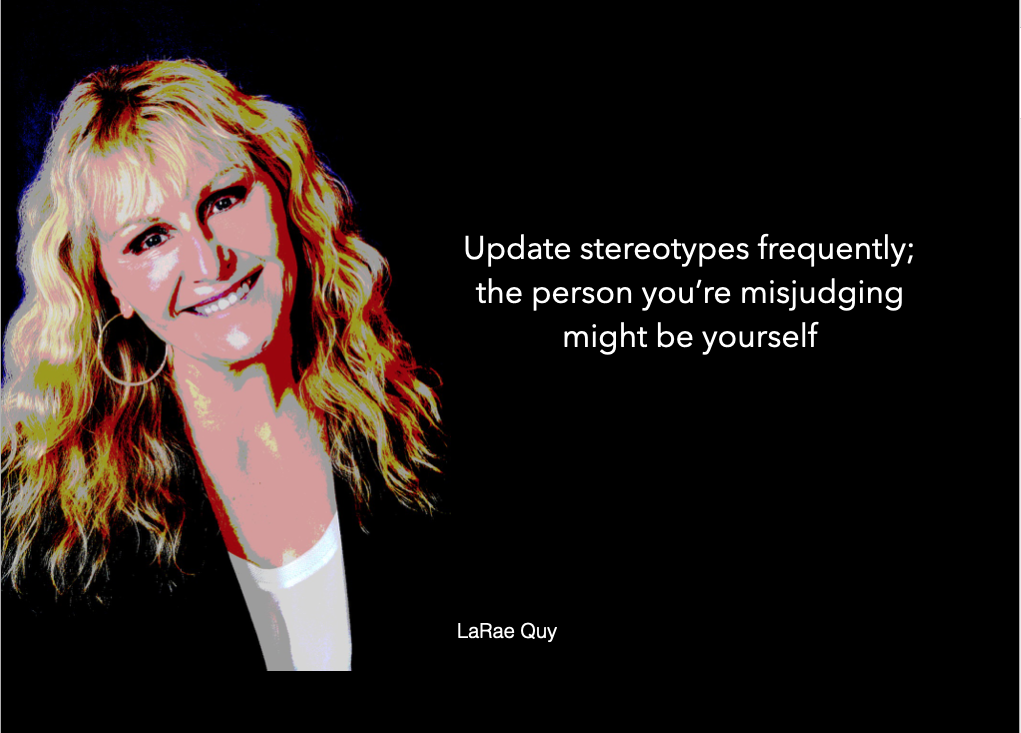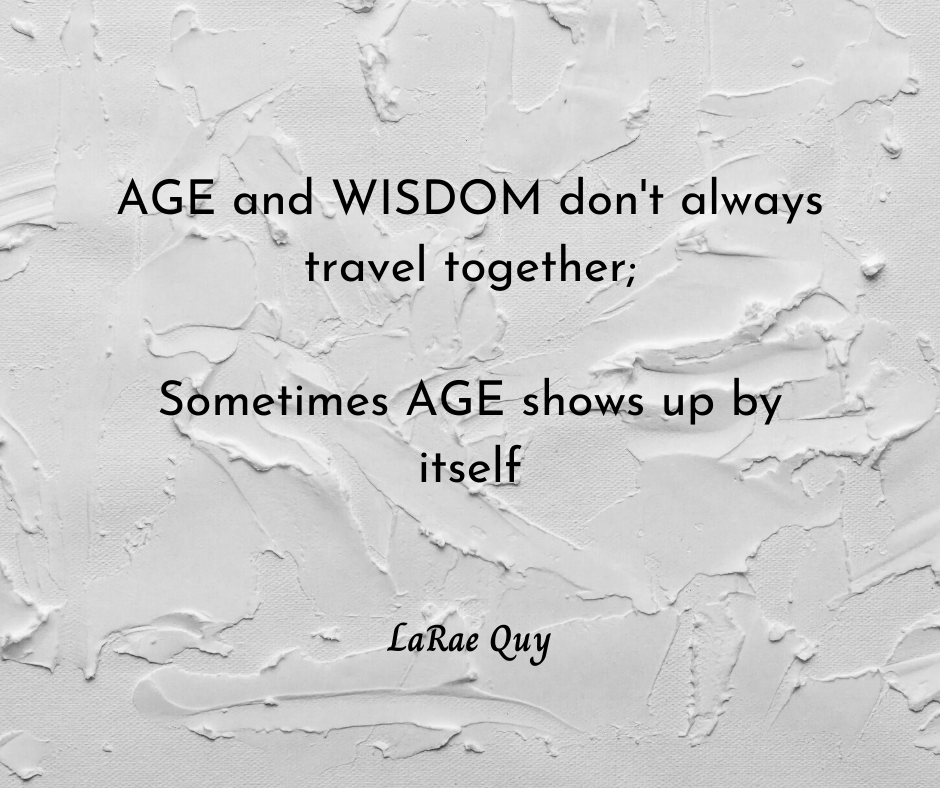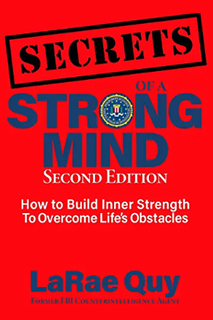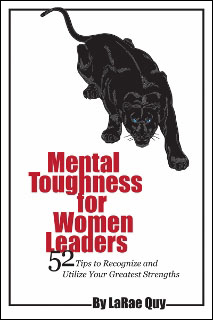I felt a sinking feeling in my gut as I drove into the parking garage, and it was happening more and more. A job that had once invigorated me and filled me with eagerness now produced a heaviness inside that I could no longer ignore.
As a new FBI agent out of the Academy, I was passionate about my mission and always pushed ahead. But, almost 25 years later, I had to admit I no longer felt the strong drive to show up at work and gear up for another day. The drive had been replaced by a heaviness that stripped away my motivation.
When I got home one day after work, I went for a long walk. I needed to think. I knew that the noise of activity around me didn’t allow me to pause. But I also realized that if I let myself think deeply, a few thoughts would bubble up that I didn’t want to acknowledge.
I needed to get out of my own way.
I was a performer, and throughout my career, placed great importance on achieving things. I had a good run as an FBI agent working counterintelligence and espionage cases, but something inside had shifted. I needed something to end before I could start something new.
My FBI career represented safety and comfort, but once I allowed myself to explore deep longings that I’d experienced since childhood, the desire to develop skills as a writer and an artist pulled at my heart.
Whoa! No place for handcuffs and a gun in that world!
I asked myself the hard questions: When had the Best in my career become Good? And was it OK to settle for Good Enough? I had conflicting emotions: excitement about building a future with more life and fear of the unknown. Both were honest emotions and ones that I needed to acknowledge.
Why Are Endings Necessary?
Something has to end for us to take the next step in life. Life has seasons, stages, and phases. When one level reaches its past-due date, we risk shutting down the person we are meant to become. Without the ability to move from good to best, we remain stuck at a level we’ve outgrown.
If we never moved on from good, we’d still be living with mommy and daddy and working at our first job. So yeah, we need to end some good things to move into what is better. When we fail to move from good, we are destined to repeat the mistakes that keep us from moving on to the best.
It takes a strong mind to make changes in your life. Are you mentally tough? Take this evidence-based, FREE Mental Toughness Assessment.
Let’s take a look at the compelling importance of new beginnings to leave behind the good and get the best in life:
1. Prune

It’s an ancient metaphor, but pruning perfectly illustrates how to move toward growth. A good gardener will tell you there are 3 reasons to prune:
- Eliminate too many buds
- Eliminate sick buds
- Eliminate dead buds
If you are working on a project, relationship, or career that is siphoning off precious time and energy that could go to something/someone else, then it’s time to prune. Pruning the unnecessary will give you more time to work on the things that can help you reach your full potential.
If you realize that nothing you do can make your situation healthy, you need to prune. For whatever reason, your efforts will not make things go in the right direction, and there will be no healing or change for your situation to become what you need it to be.
If people or projects in your life are dead and taking up space, you need to prune. Sometimes we hold on to things out of habit or comfort, but they are dead weight. That ball and chain will keep us from moving toward what is best.
How To Make It Work For You: Answer these questions:
- What is your emotional response to pruning?
- Does it feel heartless and unfeeling?
- Do you cling to old habits and acquaintances because they’re comfortable?
- How would you identify the activities that distract you and take up too much space in your life?
- How would you identify the relationships in your life that are sick and unhealthy?
- How would you identify the projects, commitments, or people that are the walking dead?
2. Choose
I had come to a moment where I knew it was time to get out. I decided to retire from the FBI so that I could move on. There was a time of mourning because I had loved my job for almost 25 years. But, growing up on a cattle ranch in Wyoming, I was also very familiar with seasons and life cycles.
Hot summers were spent putting up hay, and cold winters were spent feeding it to cattle. Every spring would produce a new crop of baby calves, and every fall would see them weaned from their mothers.
Cycles are built into everything in life. Accepting this fundamental truth makes it easier to align our values with our behavior and actions to our deepest desires.
How To Make It For You: Identify ways in the past you’ve moved from one life cycle to another. When did you hesitate? What propelled you forward? Can you tease out the lessons learned from those experiences? Would you do anything differently?
3. Pursue

There comes a time when we must all choose our pain. If we’ve become accustomed to our misery, we’ve gotten used to it and see it as normal. Pain, by its very nature, signals that action is required. It should drive our behavior to end something so we can move on.
There are many reasons we don’t pursue the Best. Sometimes we are stuck in circumstances that are out of our control. Our mind becomes hardwired to adapt, which is fine except when our thinking sees our circumstances as something normal. Then, we choke off the motivation to pursue what is better for us.
Psychologist Martin Seligman calls this learned helplessness. It’s when a person accepts their powerlessness and gives up. We no longer believe in our innate ability to achieve our goals. We remain stuck in our misery and feel we have no control and that there is nothing we can do to change our situation.
At this point, our attitude is influenced as much by internal as external factors. As a result, we set limits on what we think we can do. We are stereotyping ourselves as someone who can’t move out of their rut.
Here is a good rule of thumb: “Update stereotypes frequently; the person you’re misjudging might be yourself.”
Our limitations are almost always due to internal factors—how we think about ourselves. Psychologists call this perceived error—an inability to accurately judge humans, things, or situations. We don’t see reality as it is; instead, we cling to an illusion. As a result, we no longer feel we have control over our life and fail to pursue what is truly meaningful.
How To Make It Work For You:
- Take a piece of paper and divide it into 2 columns:
- In one column, write down all the things you cannot control that are affecting you.
- In the second column, write down all the things over which you do have control.
- Now, spend some time discovering ways to take action on the things you can control.
4. Discern

What is worth keeping and fixing, or ending altogether? How do you know the difference? What is the difference between persistence and giving up?
Every person will have a different way of answering these questions, but they are questions we should all ask ourselves regularly. Part of maturity is getting to where we can let go of one desire to have another. Only the immature mind wants to have it all.
Remember this: “Age and wisdom don’t always travel in pairs. Sometimes, age shows up by itself.”
If you’ve become wizened by your experiences, you already know that the most important things in life come with a cost. The big question is this: will it be worth the pain?
I went from a knowledgeable professional to a newbie who had to start at the bottom when I set out to be a writer and an artist. It was humbling, frustrating, and painful for my ego at times, but it also produced some of the most content moments of my life.
There would have been no good reason to retire from the FBI if I hadn’t had hope, not wishful thinking. “Hope deferred makes the heart sick, but a longing fulfilled is a tree of life.” (Proverbs 13:12).
How To Make It Work For You: Ask yourself these questions:
- Do you want your present reality to be the same 6 months from now? 5 years?
- Do you want your excuses or reasons for not moving from good to best to be the same ones 6 months from now? 5 years?
- Do you want to have the same conversations with yourself 6 months from now? 1 year? 5 years?
© 2022 LaRae Quy. All rights reserved.
You can follow me on Twitter, Facebook, Instagram, AND LinkedIn
Are you mentally tough? Take this evidence-based, FREE Mental Toughness Assessment.
Check out my new online training program at www.SecretsOfAStrongMind.com
Get my book, “Secrets of a Strong Mind (second edition): How To Build Inner Strength To Overcome Life’s Obstacles.”

Author of “Mental Toughness for Women Leaders: 52 Tips To Recognize and Utilize Your Greatest Strengths”



LaRae you have nailed it! The recipe
To take the next step and not stay stuck! It is such a refreshing take on an age old dilemma for so many of us.
I appreciate this article and am definitely feeling the nudge to work the process and embrace the inevitable changes with joy and great expectations!
Thanks so much, Barbara Jean! It’s important that we all listen to that inner voice, that nudge that comes from within that encourages us to take the step to become the person we’re meant to be…to move on from what is Good Enough to what is Best.
WOW- spot ON!! I was thinking of so many people I need to send this to but then I also thought, “shoot! I needed to hear this because the person I’ve been misjudging is myself!” I had never thought in that direction for myself!! Thank you for sharing – I’m excited to meet you one day!
HI Lisa…thanks so much for your kind words! I would be honored to have you share it with your friends/colleagues. Have a great day!
Today you met!!!!!! Hooray you met LaRae🥰
The “Age showing up alone” thing made me laugh. I don’t laugh.
Haha…glad it made you laugh, Kirk! I’ve come to understand the irony of that statement more and more as I get older…
I love your post LaRae and what resonates with me is the need to move on even when we are not sure we can. I have been caught in that insane cycle of sticking with what I know but I have realized the excitement of trying something new.
Hope you are well!
Terri
Thanks for your comment, Terri! I know the insane feeling of staying on a merry-go-round just because we don’t know how to move on. I’m in the process of ending one good thing in order to move to something better. I hope you are doing well and I miss you!
New beginnings offer a fresh start and an opportunity to move forward with new perspectives, habits, and goals. They provide a chance to leave behind past mistakes and negative experiences and create a path towards personal growth and fulfillment. By embracing new beginnings, individuals can strive towards their aspirations, improve their well-being, and ultimately lead a more fulfilling and satisfying life.